|
|
|
Sort Order |
|
|
|
Items / Page
|
|
|
|
|
|
|
| Srl | Item |
| 1 |
ID:
167329
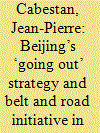

|
|
|
|
|
| Summary/Abstract |
In looking at the case of Niger, this article demonstrates that there have been a lot of similarities between China’s Belt and Road Initiative (BRI) launched in 2013 and its ‘going out’ strategy initiated in the late 1990s. Prior to 2013, many of the BRI’s objectives and strategies were already at work in Africa, and particularly in socioeconomically poor, landlocked countries that badly need infrastructure and connectivity. It also shows that China has been ready to invest in projects that are not necessarily profitable in the short term to consolidate its economic and diplomatic presence in the targeted country as well as to help its large state firms growing and internationalizing. It then demonstrates that although Niger did not belong in the initial group of countries targeted by the BRI, this initiative has contributed to deepening China’s economic and political influence in Niger, particularly to the detriment of France. Finally, this article highlights that both in Africa, particularly in the Sahel region, and in the BRI countries, China is facing emerging security challenges, continuing to mainly rely on others to overcome them.
|
|
|
|
|
|
|
|
|
|
|
|
|
|
|
|
| 2 |
ID:
113773
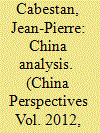

|
|
|
| 3 |
ID:
116545
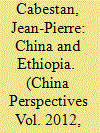

|
|
|
|
|
| Publication |
2012.
|
| Summary/Abstract |
Since 1995, China and Ethiopia have gradually forged close relations. On both sides, the establishment of this partnership was motivated as much by diplomatic, strategic, and even ideological considerations as by economic ones. For Beijing, economic and trade cooperation with Addis Ababa is a means rather than an end in itself. For Ethiopia, however, partnership with China mainly serves the internal political and economic purposes of the regime that has been in place since 1991, under Prime Minister Meles Zenawi for 20 years and, since his death in August 2012, under his successor Hailemariam Desalegn. The relationship is characteristic of the special but asymmetrical links Beijing has sought to establish with countries of the South that are strategically important but economically backward. It also illustrates the attraction the "Chinese model" of development holds in Africa and elsewhere.
|
|
|
|
|
|
|
|
|
|
|
|
|
|
|
|
| 4 |
ID:
154435
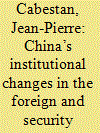

|
|
|
|
|
| Summary/Abstract |
This article focuses on the institutional changes that have occurred in the foreign and security policy realm since Xi Jinping became General Secretary of the Chinese Communist Party (CCP) in November 2012. The establishment of a National Security Commission (NSC) in November 2013, the power centralization in the Central Military Commission (CMC) and the reorganization of the CCP leadership of the People’s Liberation Army (PLA) as well as the major branches of the PLA, the reorganization in March 2013 of the various civilian maritime security agencies and the establishment in December 2013 of a Cybersecurity and Informatization Leading Small Group (LSG) are the most striking organizational reforms introduced by Xi. But other institutional changes have taken place as Xi’s inclination to rely on a larger number of actors and in particular to give his closer political allies a bigger role also in foreign and security policy. These changes have obviously helped concentrate more power in the hands of Xi Jinping and, to some extent, better coordinate domestic and external security objectives and on the whole have well served China’s foreign and security policy’s assertiveness and initiatives. However, these changes have only partly reduced the power fragmentation that has developed extensively under Hu Jintao, and they have not contributed to institutionalizing decision-making processes at the top of the CCP and the state apparatuses. On the contrary, it appears that through these changes Xi has not only created new bureaucratic overlaps and tensions but also, in relying more on his own advisers, fed frustrations and competitions among agencies and officials, in other words, new forms of power fragmentation.
|
|
|
|
|
|
|
|
|
|
|
|
|
|
|
|
| 5 |
ID:
173261
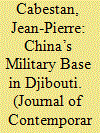

|
|
|
|
|
| Summary/Abstract |
This article analyzes China’ and the People’s Liberation Army (PLA)’s rationale in opening what it calls a ‘logistical support facility’ in Djibouti as well as the missions that it is supposed to fulfil. The author also presents this base’s activities since its opening on 1 August 2017 and explores the potential role that the Chinese military stationed in Djibouti could play to secure Xi Jinping’s Belt and Road initiative and protect Chinese interests and nationals in Africa or the Middle East. Finally, it assesses the PLA base’s relations with other militaries present in Djibouti, particularly the US, the French and the Japanese, concluding that Djibouti operates as a microcosm of a multipolar world heading towards a bipolar, though asymmetrical, world order.
|
|
|
|
|
|
|
|
|
|
|
|
|
|
|
|
| 6 |
ID:
178170
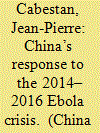

|
|
|
|
|
| Summary/Abstract |
The 2014–16 Ebola crisis in West Africa was China’s very first opportunity to demonstrate its willingness and ability to play a meaningful role in addressing public health emergencies of international concern. China’s decision to participate in the international response to the outbreak was part of an ambition to enhance its contribution to Africa’s security in general and health security in particular and to exert more influence on global norms. The specific role played by the People’s Liberation Army (PLA), especially its Academy of Military Medical Sciences, in Sierra Leone and Liberia is part of an ongoing effort to increase China’s involvement in international humanitarian assistance and disaster relief operations. It was the first time that it sent medical military teams to set up and operate infectious disease hospitals overseas. This participation also underscores the PLA’s crucial role in fighting epidemics overseas as well as at home, as the current COVID-19 pandemic illustrates. The Ebola crisis enables us to explore aspects of the PLA’s overseas missions, some of which are humanitarian and others which generally enhance China’s influence as a great power in Africa and in the world in the context of a growing Sino-US strategic competition.
|
|
|
|
|
|
|
|
|
|
|
|
|
|
|
|
| 7 |
ID:
091523
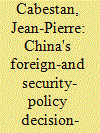

|
|
|
|
|
| Publication |
2009.
|
| Summary/Abstract |
Since 1979, foreign-and security-policy-making and implementation processes have gradually and substantially changed. New modes of operation that have consolidated under Hu Jintao, actually took shape under Jiang Zemin in the 1990's and some, under Deng Xiaoping. While the military's role has diminished, that of diplomats, experts, and bureaucracies dealing with trade, international economic relations, energy, propaganda and education has increased.
|
|
|
|
|
|
|
|
|
|
|
|
|
|
|
|
| 8 |
ID:
161259
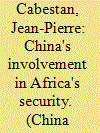

|
|
|
|
|
| Summary/Abstract |
China has been much more involved in Africa's economy and trade than in its security. However, over the past decade or so, China has increased its participation in the United Nation's Peacekeeping Operations (UN PKOs), particularly in Africa. It has also taken steps to better protect its overseas nationals and, in 2017, established a naval base in Djibouti. This article focuses on the participation of China's People's Liberation Army in the United Nation's Multidimensional Integrated Stabilization Mission in Mali (MINUSMA) since 2013. It aims to unpack the diplomatic process that led China to take part in this mission and to analyse the form of this participation. Mali was the second time (the first being in South Sudan in 2012) that China opted to deploy combat troops under the UN banner, underscoring a deepening involvement in PKOs and an increasing readiness to face risks. Finally, this article explores the implications of China's participation in the MINUSMA for its foreign and security posture as a whole. Often perceived as a realist rising power, by more actively participating in UN PKOs China is trying to demonstrate that it is a responsible and “integrationist” great power, ready to play the game according to the commonly approved international norms. Is this really the case?
|
|
|
|
|
|
|
|
|
|
|
|
|
|
|
|
| 9 |
ID:
095671
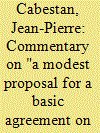

|
|
|
|
|
| Publication |
2010.
|
| Summary/Abstract |
The main question that Chang Ya-chung's Modest Proposal triggers is whether a political and security agreement can realistically be reached today. The twelve agreements signed by Beijing and Taibei since 2008 should be saluted as conducive to constructing détente, nonmilitary confidence-building measures and de facto government-togovernment relations across the Strait. However, in the foreseeable future, is it realistic to ask for more? Actually, a temporary or long-term political agreement between Taibei and Beijing will not be reached if the People's Republic of China (PRC) and the Republic of China (ROC) refuse to formally recognize each other's separate existence and sovereignty in one way or another, at least tacitly, and if they do not agree to address security issues squarely with the assistance of the USA. Finally, no meaningful agreement can be reached either if the PRC Chinese and certain segments of the Kuomintang (KMT) (Guomindang) fail to recognize Taiwan's specific history or realize that the Taiwanese have been developing a distinct identity since 1949 and even more so since the island's democratization took place in the late 1980s.
|
|
|
|
|
|
|
|
|
|
|
|
|
|
|
|
| 10 |
ID:
077620
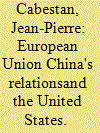

|
|
|
|
|
| Publication |
2006.
|
| Summary/Abstract |
Spurred by a growing trade relationship as well as China's desire to build a more multipolar world and the EU's aspiration to play a more active and independent role in international affairs, the two sides have established a close economic and political partnership. However, the EU is a political body that is both complex and rather weak. The majority of EU member states continue to see the United States more as a close strategic partner than as a superpower that the EU should counterbalance. Moreover, the EU's relationship with China has become more difficult to handle due to a deepening trade deficit and lack of progress by China on human rights. Thus, the EU's China policy will remain based on the lowest common denominator of its member states' China policies, whereas its close military relations with the United States will probably continue to affect the strategic dimension of EU-China relations and negate the possibility of a genuine strategic triangle emerging.
|
|
|
|
|
|
|
|
|
|
|
|
|
|
|
|
| 11 |
ID:
058498
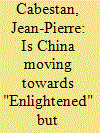

|
|
|
|
|
| Publication |
Sep-Oct 2004.
|
|
|
|
|
|
|
|
|
|
|
|
|
|
|
|
| 12 |
ID:
118680
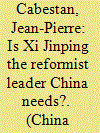

|
|
|
|
|
| Publication |
2012.
|
| Summary/Abstract |
In autumn 2012, following the 18th Congress of the Chinese Communist Party (CCP), Xi Jinping is to succeed Hu Jintao as General Secretary of the Party and also, in all probability, as Chairman of the Central Military Commission, where he has been second-in-command since 2010. In March 2013, he is set to become President of the People's Republic of China. Born into the political elite, he enjoys a great deal of support in the Nomenklatura. Having governed several coastal provinces, the current Vice-President is thoroughly acquainted with the workings of Party and state. He also has support within the Army, where he spent a short time at the beginning of his career. In addition, in recent years, he has acquired significant international experience. Urbane and affable, Xi is appreciated for his consensual approach. Nonetheless, Xi is taking charge of the country at a particularly delicate time. China is having to adopt an alternative growth model whilst the government is struggling with powerful economic and regional feudalities. The Bo Xilai affair has highlighted the weakening of the central government, the corruption of the elites, and deep-rooted ideological differences within the Party machine that are damaging the political legitimacy of the regime and endangering its stability. As a result, Xi must not onlyreunify the Party leadership and machine but also establish his authority over all the country's civil and military institutions. His style and charisma will help him. But his success will also and above all depend on his ability to form a united coalition set on reform and capable of dismantling the privileges acquired by the regime's many bosses. The CCP needs a leader who is both strong and courageous. Is Xi such a man? Perhaps.
|
|
|
|
|
|
|
|
|
|
|
|
|
|
|
|
| 13 |
ID:
065965
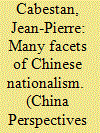

|
|
|
| 14 |
ID:
100652
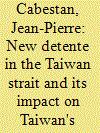

|
|
|
| 15 |
ID:
189219
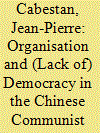

|
|
|
|
|
| Summary/Abstract |
There has always been a lack of democratic life in the Chinese Communist Party (CCP). Former CCP Secretary General Hu Jintao attempted in the first decade of the twenty-first century to promote reform, including a revision of the party constitution, aimed at enhancing “intra-party democracy” (党内民主, dangnei minzhu). However, Xi Jinping has put on hold this plan, fully restoring the verticality of the institution where it may have been weakened. This article has three objectives. First, it compares the successive versions or iterations of the CCP constitution in the last 100 years and analyses all the changes related to democratic centralism, elections, and democracy that have been introduced. Then, it assesses Hu's reforms and their failure. Finally, it explains why the CCP cannot reform and democratise as long as it remains a party-state and China remains a one-party system.
|
|
|
|
|
|
|
|
|
|
|
|
|
|
|
|
| 16 |
ID:
167165
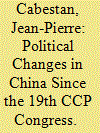

|
|
|
|
|
| Summary/Abstract |
Since the 19th Congress of the Chinese Communist Party (CCP), Xi Jinping has continued to dominate the political stage. Having succeeded to abolish the two-term limit for the presidency in March 2018, he has consolidated even more his power, restructuring several Party and state agencies and promoting many supporters to key positions. He has also privileged very conservative policies, raising questions about China’s reform and open-door strategy. However, in the summer of 2018, in the context of a growing trade war with the US, his opponents have launched an offensive that has highlighted deepening divisions within the Party leadership and among the elites. While today Xi is more contested than before, his detractors have remained unable to weaken him, let alone to use the trade war with the US, to force him to radically change course.
|
|
|
|
|
|
|
|
|
|
|
|
|
|
|
|
| 17 |
ID:
135761
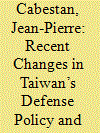

|
|
|
|
|
| Summary/Abstract |
In spite of John Mearsheimer (and others)’s dire prediction, Taiwan still believes that, rather than having to negotiate like Hong Kong a level of autonomy acceptable to Beijing, it can remain de facto independent as long as it is able to keep a credible conventional deterrence and a strong security relationship with Washington. The recent changes in Taiwan’s defense policy as well as in Taiwan-USA relations tend to confirm that belief and willingness. However, the island is facing growing security challenges that will not be easy to fix. And overcoming these challenges will depend much more upon the Taiwanese’s resolve than the USA’s intention to remain committed to the island’s security.
|
|
|
|
|
|
|
|
|
|
|
|
|
|
|
|
| 18 |
ID:
074903
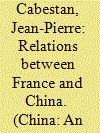

|
|
|
|
|
| Publication |
2006.
|
| Summary/Abstract |
The French Government believes that China, as an independent player in international relations, can contribute to balancing the US' "hyperpower" and help raise France's influence in global affairs. Instead of a Paris-Beijing axis, the relationship is more that of an entente cordiale based on common economic, strategic and cultural interests.
|
|
|
|
|
|
|
|
|
|
|
|
|
|
|
|
| 19 |
ID:
120955
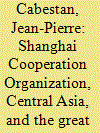

|
|
|
|
|
| Publication |
2013.
|
| Summary/Abstract |
The Shanghai Cooperation Organization (SCO) appears today as a mature, comprehensive, and inclusive intergovernmental regional organization. However, co-piloted by China and Russia, the SCO's course still raises many questions about its objectives, priorities, and, more important, its achievements and raison d'être, as well as the enduring rivalries among its members.
|
|
|
|
|
|
|
|
|
|
|
|
|
|
|
|
| 20 |
ID:
067640
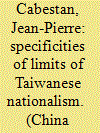

|
|
|
|
|
|
|
|